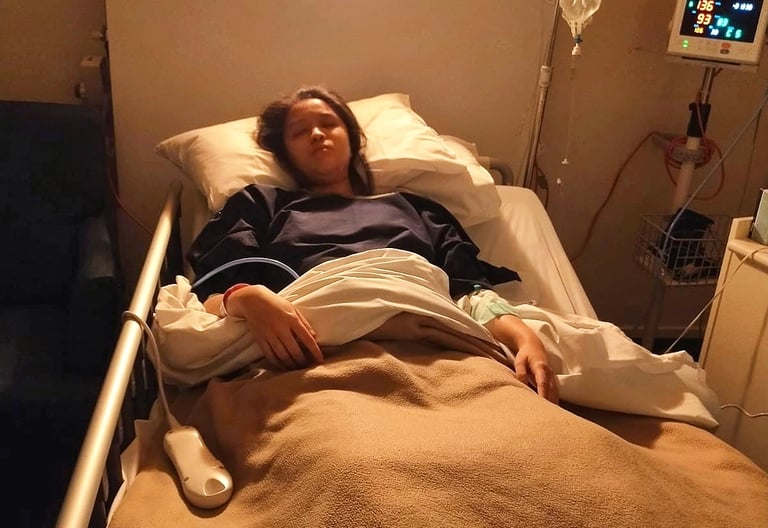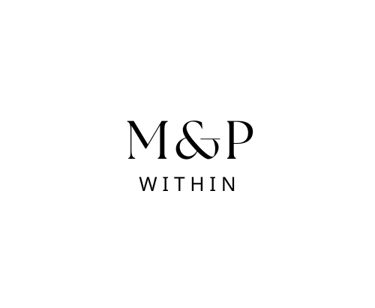Beyond the Diagnosis: How My Journey Led Me to Create This Space & Find Power Within
STORIES
2020 was defined by global upheaval due to the COVID-19 pandemic, leading to new restrictions, hospital understaffing, and major delays for patients awaiting care. As an RN, it was the year I faced personal health challenges, including several emergency admissions, multiple misdiagnoses, and consultations with 15 doctors before finally being diagnosed with endometriosis.
Onset of Symptoms
For as long as I can remember, my periods have been heavy and painful, but things took a turn for the worse in June 2019. That summer, I began to feel exhausted all the time, and soon I was hit with sharp, stabbing pain on the lower right side of my abdomen. These new symptoms signalled a major change in my health and foreshadowed a tough road ahead.
At first, I assumed it was appendicitis due to the nature of the pain and other symptoms I experienced until February 2020, when it became unbearable. Both the emergency doctors and the surgical team suspected appendicitis too. Even after my appendix was removed, the same knife-like pain persisted, unfazed by morphine. My condition worsened, leaving my surgeon and the nurses puzzled as they tried everything to get to the bottom of what was going on.
Post-Surgical Findings and Reflections
Upset and deeply concerned about the possibility that my surgery may have been unsuccessful, I took proactive steps to understand exactly what had happened. I requested access to all my medical notes and the surgical registrar’s findings. Upon reviewing his report, I learned that, following the laparoscopic procedure, my reproductive organs were described as “normal.” Additionally, the pathology results indicated that my appendix was also normal, with no abnormalities detected.
Confused, distressed and still in pain two months after surgery, I grew increasingly worried and frustrated, wondering what might be wrong. I went to see my GP because I was experiencing bloating and changes in my bowel movements. Suspecting a gastroenterology issue, my GP suggested switching to a low FODMAP diet, but this did not relieve my pain. Driven with determination to find answers fast, I started doing my own research on the internet and reading my own medical textbooks, where the term “endometriosis” caught my attention for the first time. Yet, I remained uncertain despite sharing similar symptoms, until my mother mentioned she had endometriosis when she was my age. This sparked a pivotal question in my mind: "What if I have it too?" Although this was possible its genetic predisposition, I knew, as a health professional and from my research, that diagnosing endometriosis can be incredibly difficult and requires laparoscopic surgery for confirmation.
Between February and late May 2020, I mentioned my suspicion of endometriosis during several ED visits, noting my family history and clinical reasoning as a nurse. However, my concerns were dismissed, and I was instead diagnosed with renal colic, interstitial cystitis, IBS, and diverticulitis. Sent home with feelings of confusion and frustration, I desperately hoped they were right, and I was wrong. But I was sick and tired of coming to the hospital, not getting answers, just getting pain relief and being sent home without a cause being found. The pain relief, although I am grateful for the healthcare staff who provided it to me, felt like a band aid. Fortunately, my determination led me forward. After carefully analysing my test results and spending many late nights conducting in-depth research, I chose to concentrate solely on endometriosis, having systematically eliminated many other possible conditions.
But each hospital visit resulted in increased feelings of discouragement and a sense of being dismissed, which began to adversely affect my mental health. With every hospital admission, with every doctor's visit, my health condition deteriorated. My fatigue intensified, I began experiencing pain with urination and bowel movements, nausea, vomiting, and most alarmingly, the pain started to spread beyond my menstrual cycle, engulfing my entire lower pelvis to the point where I could no longer walk. I became dependent on a wheelchair, my father had to carry me to the bathroom, and my mother assisted with showering. This rapid progression stripped away my independence, transforming me from a then self-sufficient 28-year-old into someone unable to perform basic self-care. I remember crying to my parents in shame and helplessness when I was in pain telling them I felt like giving up on life. I prayed daily for a miracle, for someone to truly listen to me, while simultaneously grappling with the despairing questions: "Why me?" and "If none of these doctors can help or listen, then no one can." This spiral of anxiety led me into a deep depression, but I still had that little bit of hope to keep going and not give up, thanks to the love of my family and friends from afar. Without them, I would have truly given up all hope.
It wasn't until late May 2020 that I decided to take a bold step. After consulting with fifteen different doctors, I sought out an endometriosis specialist and surgeon in the private sector, driven by an unshakable intuition that I had endometriosis and needed another perspective. Though it was a risk financially and health-wise, I felt it was essential to regain control over my body. To my astonishment, at my first appointment, the specialist already had all my hospital and GP records ready, so I didn't have to recount my entire experience again. After going through the notes, he indicated that endometriosis was highly likely, but confirmation would require laparoscopic surgery.
Anxiety lingered—I worried nothing would show up and I’d be back where I started. Yet, during our consultation, I experienced an unfamiliar sense of safety and validation; I trusted his expertise completely. Internally, I promised myself: if endometriosis was confirmed and I recovered, I would devote myself to supporting other women with the same condition, enhance my nursing skills, and advocate passionately for those suffering similarly. My aim became clear: reduce diagnostic delays and help others access care promptly, turning my own challenges into empowerment for others.
My suspicion of endometriosis was confirmed after surgery on 8 June 2020. Receiving this diagnosis validated what I had been experiencing and gave me hope. This journey has had a profound impact on my life. Although it may sound unusual, I feel incredibly grateful for what I've gone through. It has helped me become a better nurse, see life from a new perspective, appreciate small moments, and truly embrace every day. I am also deeply thankful for the compassionate doctors and nurses who renewed my faith in healthcare professionals—they listened and never gave up on me. Overall, this experience has played a vital role in helping me discover my own strength and sense of purpose.
Throughout this journey, I discovered a significant lack of endometriosis awareness among healthcare professionals. Even as a health professional, I faced major challenges obtaining a diagnosis, which made me realise how much harder it must be for those without medical knowledge. This realisation ignited a fire in me—I knew I had to do something. That's why I created this platform: to close the gap in women's health education, reduce diagnostic delays, and remind you that you are not alone. This experience has helped me discover my own strength and sense of purpose, and now I want to help you discover yours too.
You deserve to be heard, believed, and diagnosed without years of suffering.


Image: recovery photo post-op after my first endometriosis surgery. Big thank you to my endo specialist and surgeon Dr Anil Sharma, the anaesthetist, and the caring nurses at Mercy Hospital, Greenlane, Auckland.


